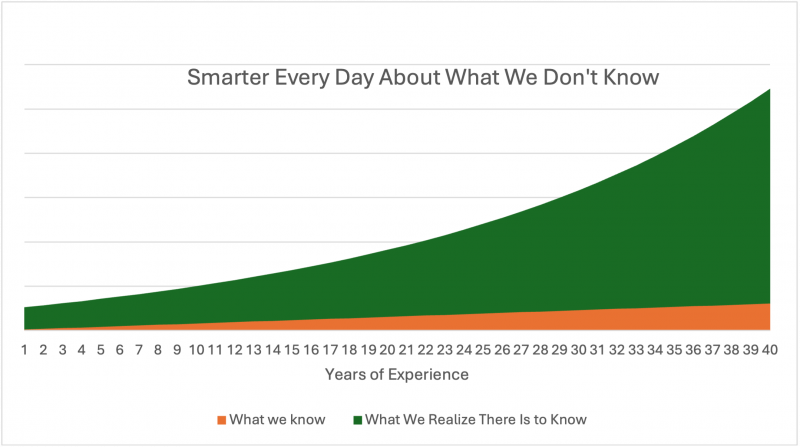The Sound of Expertise

At the beginning of our careers, we feel like imposters. We know a little bit of theory and have a little bit of practice but worry that the “adults” around us are going to embarrass us when they realize we don’t know everything about everything.
We all suffer from “imposter syndrome” at some point. How we learn to respond to this unsettled feeling is what separates the leaders and professionals from rest. As careers progress and we gain increased knowledge and experience, most of us begin to realize a paradox: we are growing more experienced professionally, but the amount of information in our knowledge domains is growing faster than we can absorb.

There are several popular responses to the growing awareness that we can never know everything in our given professions:
- Bluff—Try to make people think you know more than you do—make pronouncements.
- Check Out—Become afraid that you are no longer relevant and avoid talking about subjects related to the knowledge domain to avoid embarrassing yourself—be passive and don’t ask questions.
- Be more humble—Realize that no one has all the answers. Ask more questions and seek input from others
Stop and reflect, do any of the people you work with exhibit these behaviors? Which are most effective? The best leaders and consultants I work with tend toward response 3, even when they are pretty sure they know the answer to a question, they tend to seek additional information to understand the context of the problem they are observing to see how well it matches their experience. Often, you will hear questions like these:
- In my experience, X would seem like a logical choice. Is there something I’m missing?
- What do you see as the advantages, disadvantages, and risks of choosing option Y?
- What options have we not considered yet?
- What assumptions are we making here?
- Have you encountered this situation before? What course of action did you take? What was the result? How is this situation like the one in your experience? How is it different?
- Is there a way to simplify this situation?
- Are there safe/easy/inexpensive/fast ways to test alternatives?
- Who isn’t in the room that might have useful insights into this issue?
With experience we realize that the thinking of several smart people can often outperform a solitary genius. Even when they can’t, they can sometimes help a genius better understand a problem by teasing out subtle aspects of the problem context.
Seeking wisdom from your team is not a confession of incompetence. It is an acknowledgement that everyone brings different perspectives and experience to any problem. If the goal is to come up with a good solution, involve the people around you and you will likely discover better ideas.
Listen for the sounds of expertise. Most often they are questions, not answers.

